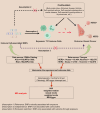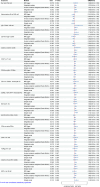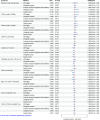Causal relationships between immune cell traits and HER2 subtypes in breast cancer: a Mendelian randomization study
- PMID: 40764893
- PMCID: PMC12325163
- DOI: 10.1007/s12672-025-03358-6
Causal relationships between immune cell traits and HER2 subtypes in breast cancer: a Mendelian randomization study
Abstract
Background: Breast cancer can be classified based on HER2 status into HER2-positive (HER2+) and HER2-negative (HER2-) subtypes, which differ significantly in pathogenesis, prognosis, and treatment response. Immune cells are critical components of the tumor microenvironment, influencing breast cancer progression. However, their specific roles in HER2 + and HER2- breast cancer subtypes are not yet fully understood.
Methods: This study applied Mendelian randomization (MR) analysis to investigate causal relationships between 731 immune cell phenotypes and breast cancer with different HER2 statuses. Genetic data were obtained from the Finngen and OPENGWAS databases. Inverse variance weighted (IVW) analysis and sensitivity tests were used to ensure the robustness of results.
Results: Our analysis revealed significant associations between specific immune cell traits and breast cancer subtypes. For instance, B cell traits such as "Sw mem %B cell" and "IgD- CD38- %B cell" were positively correlated with the development of HER2 + breast cancer. Conversely, traits associated with T cell maturation and myeloid cells demonstrated a negative correlation with HER2 + breast cancer. Regulatory T cell traits were more strongly linked to HER2- breast cancer.
Conclusions: Distinct immune cell profiles are associated with HER2 + and HER2- breast cancers. These findings provide insights into the immunological differences between subtypes and suggest potential targets for personalized immunotherapy strategies. Further research is required to clarify underlying mechanisms.
Keywords: Breast cancer; HER2; Immune cells; Mendelian randomization.
© 2025. The Author(s).
Conflict of interest statement
Declarations. Ethics approval: The data we used were obtained from published studies approved by the corresponding ethics committee, thus no further ethical approval was required for this study. Competing interests: The authors declare no competing interests.
Figures



Similar articles
-
Genetic association of lipid traits and lipid-related drug targets with normal tension glaucoma: a Mendelian randomization study for predictive preventive and personalized medicine.EPMA J. 2024 Jul 13;15(3):511-524. doi: 10.1007/s13167-024-00373-5. eCollection 2024 Sep. EPMA J. 2024. PMID: 39239107
-
Ischemic Stroke May Increase the Risk of Crohn's Disease and Ulcerative Colitis: Evidence from a Bidirectional Mendelian Randomization Study.World Neurosurg. 2025 Apr;196:123718. doi: 10.1016/j.wneu.2025.123718. Epub 2025 Mar 13. World Neurosurg. 2025. PMID: 39929265
-
Insights from Mendelian randomization and genetic correlation analyses into the relationship between endometriosis and its comorbidities.Hum Reprod Update. 2023 Sep 5;29(5):655-674. doi: 10.1093/humupd/dmad009. Hum Reprod Update. 2023. PMID: 37159502 Free PMC article. Review.
-
Systemic treatments for metastatic cutaneous melanoma.Cochrane Database Syst Rev. 2018 Feb 6;2(2):CD011123. doi: 10.1002/14651858.CD011123.pub2. Cochrane Database Syst Rev. 2018. PMID: 29405038 Free PMC article.
-
CD27 on IgD-CD38-B Cells Mediates the Coprococcus-COPD Link.Int J Chron Obstruct Pulmon Dis. 2025 Jul 3;20:2173-2182. doi: 10.2147/COPD.S518455. eCollection 2025. Int J Chron Obstruct Pulmon Dis. 2025. PMID: 40626314 Free PMC article.
References
-
- Rodgers KM, Udesky JO, Rudel RA, Brody JG. Environmental chemicals and breast cancer: an updated review of epidemiological literature informed by biological mechanisms. Environ Res. 2018;160:152–82. - PubMed
-
- Marchiò C, Annaratone L, Marques A, Casorzo L, Berrino E, Sapino A. Evolving concepts in HER2 evaluation in breast cancer: heterogeneity, HER2-low carcinomas and beyond. Semin Cancer Biol. 2021;72:123–35. - PubMed
-
- Loibl S, Gianni L. HER2-positive breast cancer. Lancet. 2017;389(10087):2415–29. - PubMed
Grants and funding
LinkOut - more resources
Full Text Sources
Research Materials
Miscellaneous
